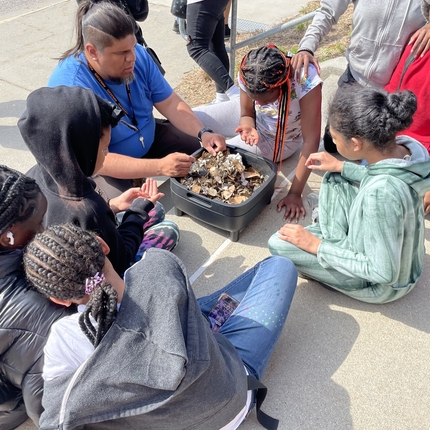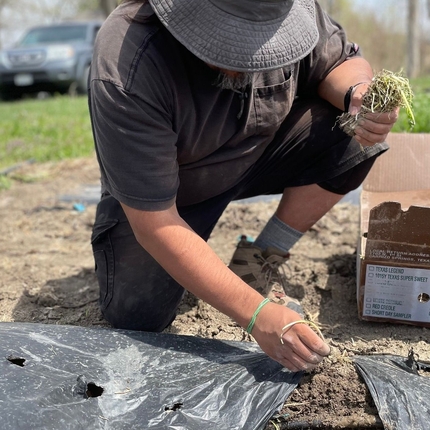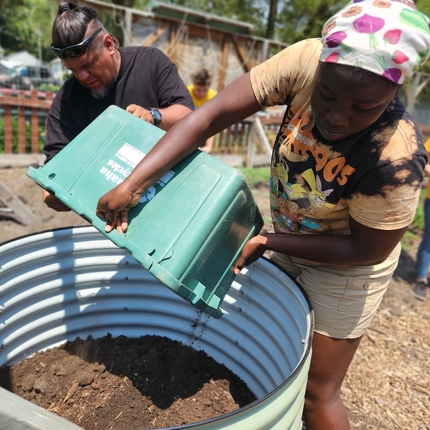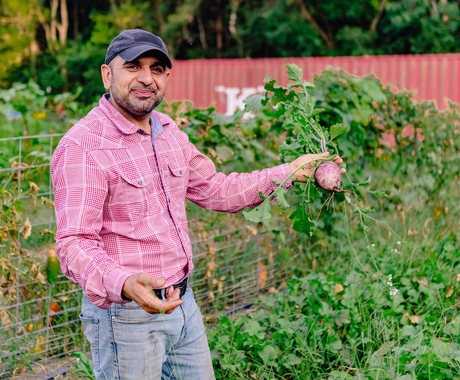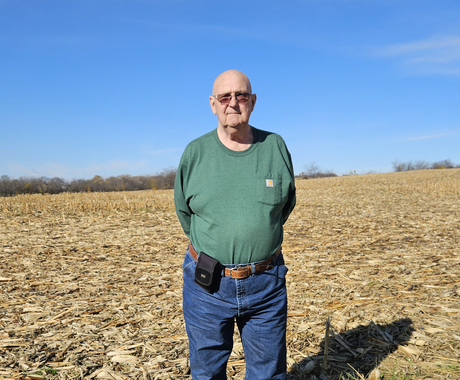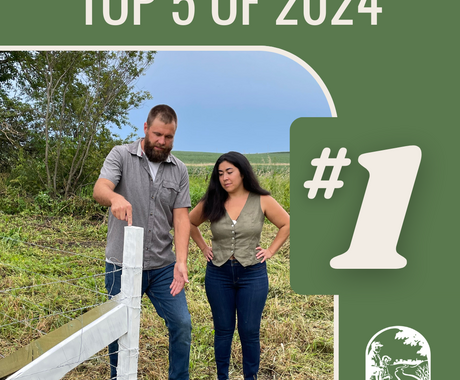Cait Caughey and Angelyn Wang contributed to this story.
After spending time working in the corporate world, Edgar Romero Gonzalez grew tired of feeling insignificant, like his only purpose was making money for his employer.
He wanted to do something more; he wanted to make an impact.
Upon reflecting on a time when children would help their families grow food, Edgar felt farming was something meaningful to which he could dedicate his time.
“I realized growing food is important, especially with what is going on in the world such as climate change and political turmoil, especially in the food system,” he said. “Even if we are going through challenges in the world, I think this is a vital skill that most of us lost, including myself.”
Edgar found like-minded people to farm with, and today he works as site manager and an assistant educator with City Sprouts Urban Farm in Omaha. Edgar oversees operations of City Sprouts South Campus and organizes with the Spanish-speaking community in the neighborhood around the garden.
At City Sprouts, they farm organically with the earth in mind, which sparked Edgar’s interest in learning more about conservation practices. He applied for and was accepted into the Center for Rural Affairs’s Beginning Farmer Conservation Fellowship Program.
The program began in 2022 with eight individuals, plus mentors. Eight more beginning farmers, including Edgar, were selected to participate in the second cohort of the program starting in February 2023.
“For me, if you know how to do things right with the land and more efficiently, you can always tweak it to what your farm needs,” he said. “Beginning farmers need to learn about these things so they know from the very beginning how to take care of their resources. It is so important for us to understand that the resources we use are limited. We have to make sure we are protecting and rebuilding them.”
As part of the program, conservation fellows design and implement a project on their own farms or land they are farming. They present their findings at a farm tour to their mentors, project partners, and other beginning farmers.
For his project, Edgar chose to focus on something he’s very passionate about: water conservation.
“Because of the site at City Sprouts, I saw a huge need for us to conserve water and irrigate a garden using a more efficient system,” he said. “By installing drip irrigation and designing it properly I am hoping to show the many benefits for the soil and crops on site. I am hoping it will reduce our water usage while also increasing the quality and quantity of the food we grow.”
City Sprouts South focuses on planting what is culturally appropriate for Latino and Native communities, as the farmers aim to grow what their neighbors require and request. This year, they planted the three sisters (corn, beans, and squash), as well as eggplant, kale, cucumbers, watermelon, Stevia for diabetics looking for alternative sweeteners, and more. They also grew a variety of peppers, including ghost peppers, Carolina reapers, and sweet peppers.
The farmers use different systems at City Sprouts, including a self-watering bed for a successful celery crop. The fencing they put up also serves as a trellis, and Hügelkultur beds are incorporated, which work well in times of drought as they slow down and trap more water. Hügelkultur is a horticultural technique where a mound constructed from decaying wood debris and other compostable biomass plant materials is later (or immediately) planted as a raised bed.
Additionally, the produce from City Sprouts goes to food pantries in Omaha.
“This goes to show that with a little work and ingenuity you can have something that is self-sustaining,” said Edgar. “We don’t just grow the food, we also utilize the food from the garden to showcase different and alternative ways to grow food. It is an educational garden.”
Edgar wants people to know that growing food is simple, and he encourages them to try it for themselves.
“I think we have been taught that it’s difficult, which makes people stay away from it,” he said. “It is not that hard to put a seed down and then water it. By doing this work, people can take back ownership of their diet, their health, and their food system.”
He also feels everyone should have access to organic food, not just those who can afford to buy it at health food stores.
“The little bit of effort that we can each put in, such as volunteering at a farm or community garden, assists us with creating a local food system. It builds community, it makes us less reliant on imported food,” Edgar said. “All of this work takes us back to how things used to be when we ate more seasonally. We had more relationships, and shared food openly.”
As he continues his agricultural journey, Edgar hopes to carry on with what he’s doing, but on a much larger scale.
“I want to champion farming as a vector for education, and I want to grow new varieties of food to donate to pantries,” he said. “The way I see things, the more we grow, the more need there is to get the food to people and to food pantries.”
The Beginning Farmer Conservation Fellowship is a program of the USDA-NRCS under agreement number NR223A750003C004 Conservation Outreach: Equity Conservation Cooperative Agreements.

